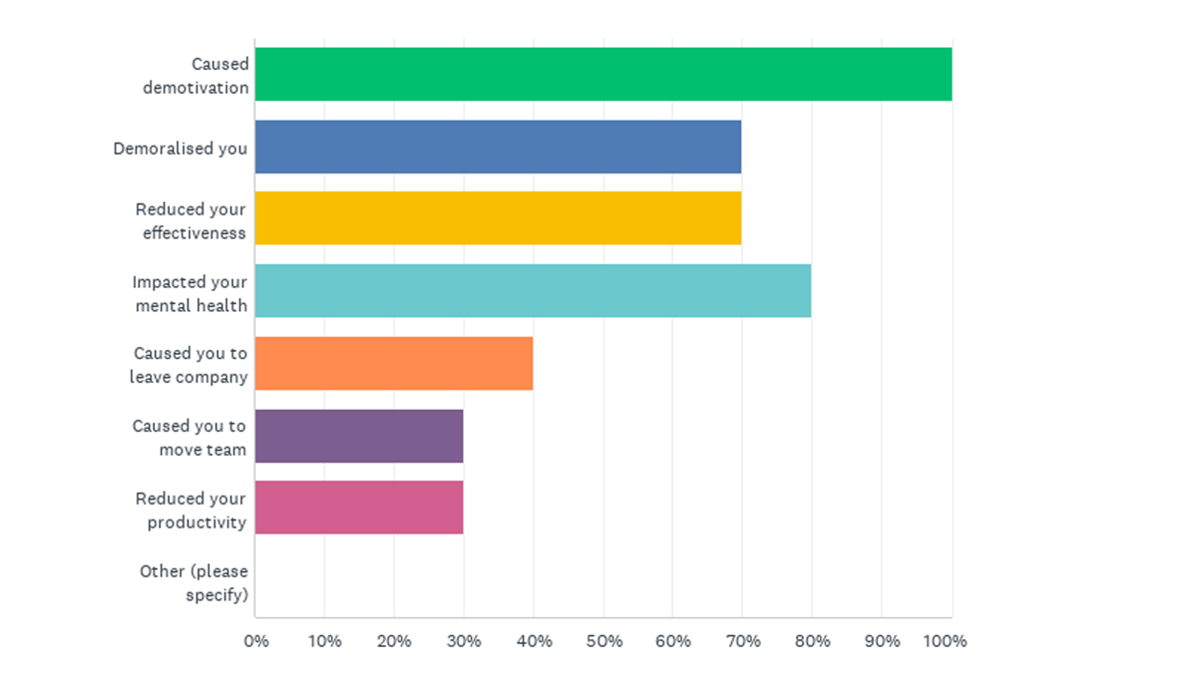Introduction
Managers play a crucial role in organisations, organising and directing teams to achieve goals. However, managing is more than just getting people to do what you need them to do, when you need them to do it.
To succeed, managers must create strategies for their teams, be able to resolve conflicts, motivate people, provide meaningful feedback, act as coaches and mentors, manage performance, look after their team members wellbeing, maintain a positive culture, identify and manage performance issues, and carry out a plethora of other duties.
It is my belief, substantiated by my own experiences through my career, that despite the important role managers play, far too often employees encounter managers who are just plain bad at their jobs. To explore this further, and find out if my experience was the exception rather than the rule, I conducted some research into peoples experience with their managers. In this article I will explore the outcome of that research, and discuss the impact that poor managerial performance can have on employees and organisations.
Bad Managers: A Common Experience?
A study by Gallup found that companies fail to select the person with the right skillset to be a manager 82% of the time. Of course, this doesn’t naturally lead to 82% of managers being bad; with the right training and support there is no reason they can’t learn and develop the necessary skillset.
However, given the important role managers provide, it does raise questions about how many of the ill equipped managers are able to lead their teams effectively and drive organisational success.
More encouraging is a study conducted by the Financial Times in 2019 which found that only 13% of managers within Europe were rated bad. This was surprising to me; throughout my 20+ years of work I would estimate that 10% of my managers have been excellent, 10% good, 40% average, 30% bad, and 10% downright terrible. This of course made me wonder if the problem, as it relates to my career experience, was not the manager but the individual being managed!
So, to try and dismiss that intrusive thought, I decided to conduct my own survey, and I began by asking the question: “during your career how many managers have you encountered that you feel performed badly?”.
Thankfully, at least in terms of my-self-belief regarding my own ability, 72% stated that they had encountered between 1 and 3 bad managers throughout their career, whilst 28% had experienced more than 3. Unfortunately, 100% of respondents had, at some point, been managed by somebody that they rated poorly.
It should be stated that there are limitations to my survey. I have asked people about their experiences during their entire career; there is no breakdown of total number of managers they have had, the industry they have worked in, and the assessment of what constitutes bad performance is entirely subjective.
This is purely a personal project and not a detailed piece of academic research, but despite the limitations, I do believe the results can offer some valuable insights into the impact of poor managerial performance.
What Makes a Manager ‘Bad’?
Defining bad management can be difficult; one employee may find their managers communication style aggressive and intimidating, whilst another may find the same managers communication clear and forthright. Additionally, a manager who gets results may well be looked on favourably by her manager and yet be largely disliked by her team.
For the purpose of this article I attempted to discover which specific traits people had encountered when interacting with someone they defined as a bad manager. There was a wide range of answers, with some respondents selecting multiple traits, but micromanagement and low emotional intelligence were the most commonly encountered (Figure 1).
I also attempted to identify which of these traits had the most impact on either the team or individual; again, micromanagement was selected the most, with low emotional intelligence and poor communication an equal second. Other responses included lack of interest in personal development or wellbeing, inconsistency, and failure to provide recognition. The scope of this research is too narrow to define a bad manager, but it is clear that employees have encountered a variety of negative traits with enough impact to result in them labelling their manager as ‘bad’.

Why Do Bad Managers Matter?
To assess the impact of poor managerial performance I asked participants how they had been affected whilst working for a bad manager. Respondents selected multiple answers; demotivation scored a 100% selection rate and mental health was the second highest selected option. Reduced effectiveness and demoralisation were also high scorers, whilst 40% of respondents had moved company as a direct result of their manager at the time (Figure 2).

Reduced motivation and role effectiveness have some obvious implications for organisations. For example, over the last 12 months’ there have been numerous articles on the phenomenon of ‘quiet quitting’. Quiet quitting occurs when employees become disengaged from their work and opt out of tasks that fall outside of their roles core responsibilities.
Although quiet quitters still carry out their primary function, many organisations build a competitive advantage around a workforce that is willing to go above and beyond[1]. Alarmingly, Gallup found that 50% of the US workforce is made up of quiet quitters[2].
There are likely to be several contributing factors behind quiet quitting, but employees who feel demotivated and demoralised are likely to become disengaged from their colleagues and the overall organisation. Additionally, if they perceive themselves to be less effective within their role, the work is going to become less meaningful, therefore, they will have reduced buy-in to the organisations mission, making them less likely to go above the call of duty.
In many organisations, there is, rightly, a focus on employee mental health . Organisations regularly offer access to mental health resources and many have implemented corporate wellness programs. This is not surprising given one study estimated that poor mental health of employees cost UK businesses £28bn in 2022[3].
Whilst it is encouraging to see businesses providing mental health support to its employees, this support will be less impactful if they do not address bad managers. As my survey indicated, poor managers directly impact employee wellbeing, with 80% stating theirs were to blame for decreased mental health.
Poor mental health is eventually likely to lead to staff turnover; Deloitte[4] found that 61% of the 28% of employees that left employers in 2021 or planned to leave in 2022, said they did so due to mental health issues. My survey found that 40% of respondents left organisations due to a specific manager, 66% of those also cited poor mental health as an impact of their experience.
Attrition can have a significant impact to employers with the cost of replacing a salaried employee an average of 6-9 months’ salary[5]. This covers the cost of recruitment, training, and salary. There are some additional, less obvious costs to a business as a result of attrition. Firstly, whilst looking to back-fill the role, there is a period in which your other employees will need to manage the burden of their exiting colleagues workload. Secondly, attrition can impact the balance of teams. The replacement may not be as effective or they may fail to fully socialise into the team or organisational culture. Both of these effects have the potential to cause team conflict and lower morale which may result in reduced productivity and further attrition. All as a result of a manager who was ill equipped to manage people effectively!
What can be done?
Clearly, a bad manager can have a negative impact in several ways, but how do organisations prevent poor performance from occurring? One obvious area is training; the Chartered Management Institute found that 82% of managers found themselves in a managerial position with no formal training in leadership[6].
Many of the negative traits that respondents flagged as being problematic can be improved trough training. Therefore, organisations should look to provide some form of leadership training to managers to ensure they have the skills, tools, and confidence to adequately carry out their managerial duties. I would argue that organisations should look to provide some form of leadership training to experienced managers as well as brand new managers, so that all of their leaders provide a certain level of consistency.
Interestingly, 40% of my survey respondents felt that an improved selection process would be the best preventative measure. This aligns with the idea highlighted by the CMI6 that 82% of people are “accidental managers”. Often, top performers in teams find themselves promoted when a manager leaves or moves, but being great at one role does not automatically mean somebody will be a great fit in another. In the same sense that post manager role attainment training can help prevent poor performance, I believe that organisations should invest in internal leadership development programs. This way, organisations can nurture and develop top talent, so that when the time arises, they are well armed to be successful in a managerial role.
30% of respondents also thought that improved organisational monitoring of managers would better address poor performance. However, only 8% of respondents said that it had been ‘very easy’ to report their managers, whilst 30% claimed it was ‘difficult’ and 62% said it was ‘very difficult’. This might explain why bad managers can significantly impact attrition rates. Organisations should find ways to regularly check the performance of their managers and ensue they find appropriate ways to address any issues. By combining robust performance reviews, leadership development programs and manger training, I believe organisations could significantly reduce instances of bad management and improve the overall performance of their business.
Conclusion
In the modern organisational landscape, the role of managers cannot be understated. They have the power to create a motivated, efficient, and harmonious workforce. Yet, the unfortunate reality is that far too often, employees find themselves in the hands of managers who fail to inspire or guide them effectively. This article, grounded in personal experiences and research, has uncovered a prevailing issue: bad management.
The consequences of poor management extend beyond the workplace. Employee demotivation, reduced effectiveness, and attrition are among the significant outcomes. The phenomenon of "quiet quitting" further underscores the harm caused by demoralisation and disengagement. Moreover, the toll on mental health cannot be ignored, with employees suffering when their managers fall short.
The cost of attrition is steep, not only in terms of recruitment and training expenses but also in terms of team dynamics and productivity. The influence of a bad manager can ripple through an organization, causing harm that goes well beyond what's immediately apparent.
Training emerges as a critical component to combatting poor management. By investing in leadership development programs, organizations can ensure that their managers have the skills and confidence required for the role. Additionally, an improved selection process and better organisational monitoring of managers are pivotal steps in the right direction.
In summary, addressing bad management is not just a matter of ethics; it's a strategic imperative for organisations aiming to thrive in an increasingly competitive world. By focusing on training, selection, and monitoring, businesses can alleviate the impact of bad managers and promote the well-being and productivity of their teams. In the end, the mark of an organization's success may well be its ability to foster great managers who, in turn, inspire greatness in their teams.


